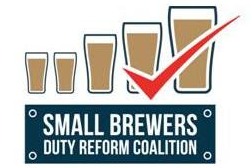More than 40 small and medium-sized breweries have today launched a coalition with the aim of persuading government to review and improve small brewers’ relief (SBR), the system that provides a discount on beer duty to small brewers.
The scheme was introduced in 2002 and then extended in 2004, but has not been reviewed since, despite the considerable changes that have taken place in the beer and pub industry, including the impact of the beer duty escalator.
 The Small Brewer Duty Reform Coalition (SBDRC) is supportive of the SBR scheme, which has stimulated new entrants to the brewing industry and promoted even greater consumer choice, and firmly believes that it is essential to the future of the sector. However, it has had a number of unintended consequences and the current structure is a significant barrier to growth.
The Small Brewer Duty Reform Coalition (SBDRC) is supportive of the SBR scheme, which has stimulated new entrants to the brewing industry and promoted even greater consumer choice, and firmly believes that it is essential to the future of the sector. However, it has had a number of unintended consequences and the current structure is a significant barrier to growth.
As an immediate step, the coalition is proposing a review by independent consultants which engages all key stakeholders, with the conclusions presented to the Treasury for their consideration. This review should have the following objectives:
- Ensure the sector is economically sustainable for the long term
- Unlock future growth potential of emerging brewers
- Deliver fairer competition for all brewers
- Stimulate exports of British beer
- Continue to promote diversity and recognise diseconomies of scale for small brewers.
The coalition strongly believes that a review can deliver these objectives and an enhanced SBR system that ensures a vibrant and sustainable brewing industry. This will produce a boost to British beer exports and deliver further growth by removing existing barriers.
Members of the coalition employ around 2,500 staff between them in breweries across the country, and annually produce more than 700 million pints. The coalition is aware of other brewers in the industry who share their concern and is inviting them to join the coalition and to make submissions when the review begins.
A number of bodies in the industry have previously proposed reform of the system, including the BBPA, CAMRA and SIBA. The coalition is keen to engage with all stakeholders in the industry and will be proposing meetings in the coming weeks.
Coalition co-chair, Rupert Thompson, of Hogs Back Brewery, said: “The introduction of small brewers’ relief in 2002, combined with a revival of consumer interest in craft brewed beers, has given the sector a huge boost. However, in recent years we have been seeing, on average, three to four new breweries opening every week, whilst over 20 pubs close. Now there is an issue of economic sustainability.”
Co-chair Collin Wood, of Theakston’s, added: “We continue to applaud and support the objectives of the original small brewers’ relief scheme, but we passionately believe that a number of its unintended consequences need to be corrected, in order to allow UK breweries of all sizes the opportunity to flourish in the future.”
Jonathan Price, of Exmoor Ales, acknowledged that reduced levels of duty for small brewers served a worthy purpose of reducing the barriers to entry, and had led to a vast increase in number of breweries. But he said: “An unintended consequence of the structure of this scheme has been, through the effective prohibition of mergers and acquisitions, undermining the value of brewery businesses, and inhibiting the natural development of breweries from small, to medium and larger scale producers to challenge the establishment. A revision to the structure of the scheme would improve the sustainability of the industry.”
Matt Jackson, of Lancaster Brewery, noted: “Small brewer relief, in its current form, acts as a major barrier to growth. At Lancaster, we made a significant investment in expansion, but found that the increased duty rate meant that we were unable to compete with those brewers receiving the full discount. As a result, we decided to scale back production to lower levels. There must be a solution that allows brewers to grow gradually beyond the current 5,000 hectolitre cliff edge.”
Coalition members
Adnams, Bath Ales, Beavertown, Black Sheep Brewery, Butcombe, Charles Wells, Cotleigh, Daleside, Daniel Batham & Son Ltd, Dark Star Brewing Company, Exmoor Ales, Frederic Robinson Ltd, Fuller, Smith & Turner Plc, George Bateman & Son, Hall & Woodhouse Ltd, Harbour Brewing, Harvey & Sons Ltd, Hepworth & Co Brewers, Hogs Back Brewery, Hook Norton Brewery Co Ltd, Hop Back Brewery plc, Inveralmond Brewery, Jennings Brewery, Joseph Holt Ltd, J W Lees & Co, Lancaster Brewery, Moorhouse’s, Nethergate Brewery, Otter Brewery, Ridgeway Brewery/Beer Counter, Ringwood Brewery, SA Brain, Shepherd Neame Ltd, St Austell Brewery Co Ltd, T&R Theakston Ltd, Timothy Taylor, Tring Brewery, Trumans Brewery, Wadworth & Co Ltd, Wychwood, Wye Valley Brewery Ltd



